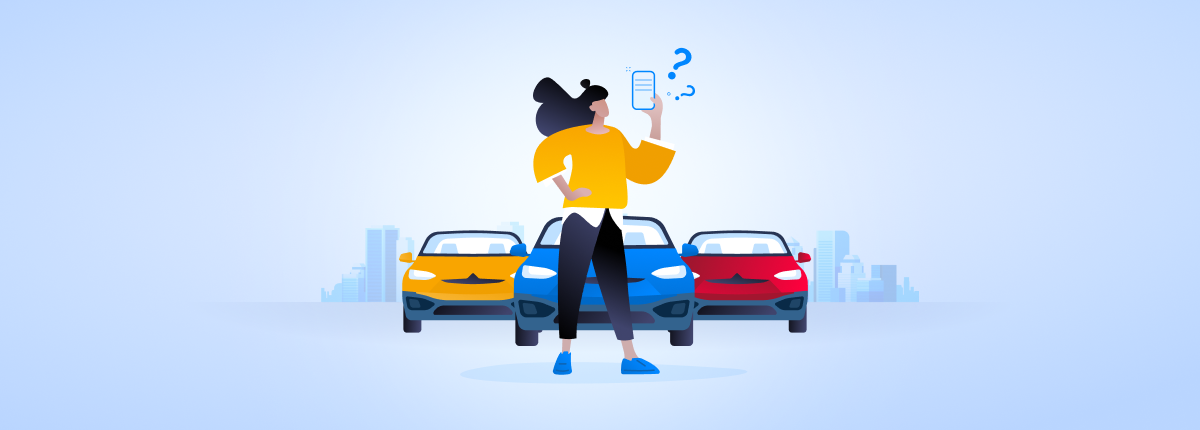
What Car Can I Afford? Determining the Best Car for Your Budget
July 30, 2022
Buying a car is an important decision and you’ll want to choose your new ride wisely. The first question to ask yourself is how much can you afford to spend. This will narrow down your car search to the best options for you. Which car you can afford will depend on your monthly income, the initial price for the car, the running costs of the car and how you intend to use the car, and for how long. Below are a few things to consider when buying a car.
Step 1: Figure out Your Budget
First of all, you’ll need to work out your overall budget. Think about how much can you spend on a car overall, how much can you put down as a deposit and how much can you spend on monthly repayments. A good rule of thumb is to not spend more than 10% of your income on a car loan and no more than 20% of your monthly income on car expenses. A great way to calculate your target price is to use a car affordability calculator like this one. Overextending yourself and buying a car out of your budget range can lead to problems later on. It’s best to be a little conservative.
Before working out the monthly costs, you’ll want to know how much you can afford to spend overall. This will help you determine whether you can afford to buy the car outright or whether you want to lease the car or opt for a rent-to-buy option. Your budget will also help you decide whether you want to get a brand new car or a used one. Once you know this figure you can work out how much you can afford to spend on monthly payments. You’ll need to look at various loan providers and car dealerships to see what their monthly payment rates are as well as their interest rate (if there are any).
Step 2: Work out the Running Costs
Owning a car comes with various monthly expenses including fuel, insurance, vehicle tax, maintenance costs, and any extra fees that might pop up here and there. You’ll also need to factor in depreciation costs. Depreciation usually affects newer cars more than used ones – the older the car the less it depreciates, so if you’re thinking of selling the car soon, an older car might be a better option.
All of these costs can add up and really depend on the car that you’re buying. Some cars consume more fuel, require more maintenance and you’ll need to pay higher taxes on them. Maintenance costs will also depend on the age of the car, how much you use the car, how you use the car overall (do you drive through dirt roads and fields with it etc). Your insurance cost will depend on your driving history, location, and the type of car you’ve chosen.
Some cars might consume more fuel, others may cost more to insure and maintain. In general cars with larger engines cost more to run in terms of fuel.
In order to figure out the insurance costs, contact an insurance company to ask for a quote on a specific car. You should be able to get a pretty accurate estimate from there.
Step 3: Find the Right Car
Once you narrowed down your budget you can start looking for cars within that range. This is the fun part! Unless you already have a specific car in mind that you want, you can browse through car magazines, pay attention to cars on the road and visit your local car dealership. You can also ask around for car recommendations or see which cars your friends, family, and colleagues drive.
Even if you have your heart set on a specific car, you can still benefit from seeing what’s out there. Who knows, you might even find a perfect car that you would have never considered before.
Think about your needs in terms of the size of the car, whether it can be used off-road, any important features that you want the car to have, must-have safety features, your garage or parking space, and more.
Step 4: Find the Right Solution to Finance Your New Car
You’ll also need to think about different car financing options on how you will make the payment, and whether you want to take out a personal loan from a registered credit provider, lease the car or get a rent-to-buy deal. The total loan amount might not necessarily be the same as the price of the car. You can find car loan calculators on the websites of most banks. These will help estimate your monthly repayment amounts.
To lease or to buy?
The question between buying a car or leasing a car is an important one to ask yourself. Leasing a car will allow you to drive a more expensive car for less money, and it’s a good option if you want to only keep the car for a few years. Leasing doesn’t require much upfront cash and also comes with lower monthly repayments. If you want to keep the car for a longer time, then you’ll actually save money in the long run by buying the car. Buying is initially more expensive but after you’ve repaid the loan, you’ll own the car for as long as the car still works.
Rent-to-buy
You can also opt for a rent-to-buy service. For this, you don’t need to have a credit check and this can make it easier to afford a car. Payments are made on a weekly basis and there are no interest costs and payments are made directly to the car dealership. This is similar to leasing a car, the only difference being that a part of your payments will go towards buying the car at the end of the lease period. You can learn more about our rent-to-buy at Planet42 service here. This is a good option for people who want to buy but who may not have the cash available to do so at this moment.
Questions to ask yourself
It’s important to ask yourself a couple of questions before taking the plunge and deciding on a car. For example:
- What will you use the car for? Will you be driving short distances or long distances?
- How big of a car do you need? How many passenger seats? Do you need space for pets, luggage?
- Are you looking for an environmentally friendly option?
- Do you need to keep running costs like fuel, tax, and insurance low?
- How long are you planning to keep the car for? Do you want to drive it for years to come or are you thinking of selling it in a few years?
- Are you looking for the most economical option? Then you might opt for a lightly used car. You should be able to pay it off and then use it for years without taking a major depreciation hit. The car will also be new enough to not incur large repair and maintenance costs.
In the end, the best car for you and your budget depends on a number of factors including the initial payment amount; running costs; whether you want to lease, buy, or rent-to-buy; whether you want to sell it after a few years or keep it for a while; and how you intend to use the car.

